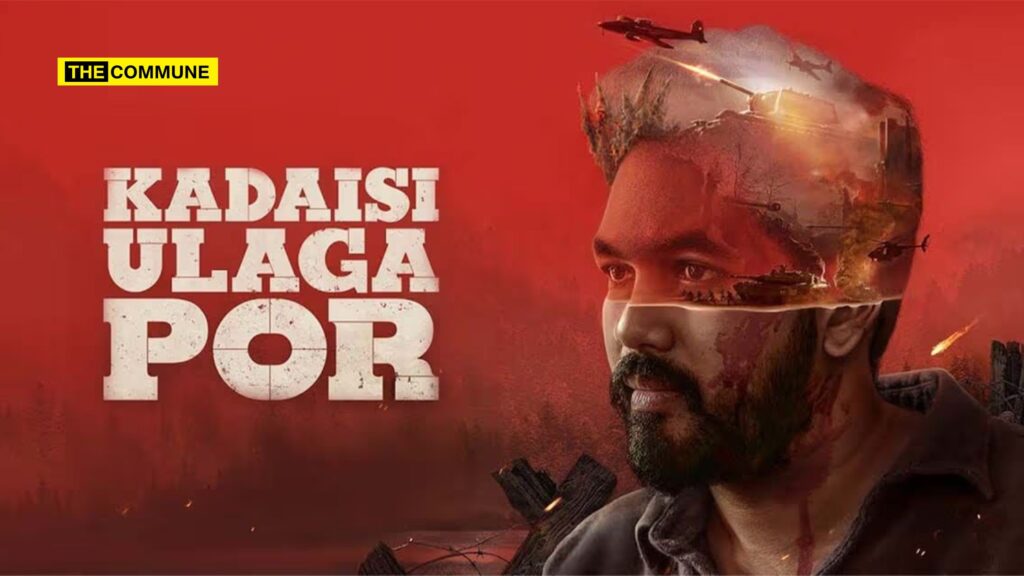Hiphop Tamizha’s “Kadaisi Ulaga Por” (The Last World War), released in 2024, transcends the typical action-packed sci-fi war movie genre. It embeds a profound message about the importance of nationalism and unity within its thrilling narrative. The film’s dystopian backdrop serves as a unique canvas to paint a story that resonates with contemporary social and political realities, while also highlighting the courage and spirit of the Tamil Indian people.
In the dystopian year 2028, Tamil Nadu Chief Minister GNR’s (Nassar) illness triggers a power struggle. His cunning brother-in-law Natarajan (Natty) schemes to install GNR’s daughter Keerthana (Anagha) as his political puppet. But Keerthana defies her uncle and initiates bold reforms with the support of her partner Thamizh (Adhi). Their progress is abruptly halted when the expansionist Chinese Forces with the meek “One Nation, One Republic” agenda, replaces the UN (United Nations) by forming the Republic Alliance, and unleashes devastation on non-compliant nations. Chennai is decimated, and its citizens face genocide at the hands of Republic soldiers. Amidst the chaos, some manage to escape. In this shattered world, Thamizh and his band of patriots rise to fight for their homeland and reclaim their freedom.
The protagonist, Tamizh, played by Hiphop Tamizha himself, begins as an ordinary young man thrust into extraordinary circumstances. As the world crumbles around him, Tamil’s dormant leadership qualities emerge, revealing his deep-seated patriotism and ability to unite people in the face of adversity. The film’s clever political satire adds another layer, prompting laughter while also provoking thoughtful reflection on the current political climate. The message is clear: amidst forces that seek to divide us, unity is our greatest strength.
Natty, alias Nataraj, shines in his dual role as both the narrator and as the anti-hero. His character arc is a testament to the transformative power of challenging times. He begins as an antagonist, selfish and cruel, but evolves into a wise guide and pillar of support for Tamizh. Natty’s nuanced performance expertly captures this growth, making his character relatable and inspiring.
In “Kadaisi Ulaga Por,” the enigmatic Priyanka Pariera emerges as a chilling antagonist, a ruthless commander within the Republic’s forces. Representing the oppressive regime, he carries out the organisation’s genocidal agenda with chilling efficiency. His history with the massacre of Sri Lankan Tamils, though not spoken in depth adds an emotional appeal to the Tamil audience. Pariera’s cold demeanor and strategic brilliance make her a formidable adversary for Thamizh and his resistance fighters. He embodies the dehumanizing nature of conflict and the lengths some will go to achieve their ideological goals, even at the cost of countless lives.
The film’s technical aspects are equally commendable. Hiphop Tamizha’s signature music infuses the narrative with energy and emotion, while the action sequences and visual effects are commendable to have come from the young music director who has transformed into a director. “Kadaisi Ulaga Por” isn’t simply an entertaining spectacle; it’s a thought-provoking exploration of themes like nationalism, unity, and leadership. It is a timely film that inspires a sense of patriotism and underscores the importance of togetherness in today’s world. Hiphop Tamizha’s directorial vision, coupled with the stellar performances of the cast and crew, makes this film a remarkable achievement.
A notable aspect of “Kadaisi Ulaga Por” is its deliberate focus on the Tamil Nadu front, leaving the status of the war outside the state largely unexplored. While the film attributes this lack of information to wartime communication disruptions, it does leave a degree of ambiguity. However, considering the movie’s primary aim to ignite a sense of unity and patriotism, rather than provide a comprehensive war chronicle, this choice is understandable.
While “Kadaisi Ulaga Por” undeniably triumphs in its storytelling and powerful message, there are moments where Hiphop Tamizha’s relative inexperience in filmmaking and screenwriting becomes apparent. Certain parts, like the rushed and unconvincing love track, the government’s wartime response, and the backstory of Thamizh as an anti-poaching squad member, limited development on minor characters, etc., could have benefited from tighter execution and a more refined narrative flow. However, the sheer strength of the story and its underlying themes of unity and patriotism overshadow these flaws, ultimately contributing to the film’s success.
“Kadaisi Ulaga Por” goes beyond mere entertainment. It’s a call to action, particularly for the younger generation, to embrace their national identity and recognize the strength that lies in unity. For this to have come from a youth icon – the Coimbatore boy, adds the necessary influential element to the movie. The deliberate choice to name the film “The last world war”, instead the third, suggests the end of wars and the beginning for unity. In a world often marred by division, this film’s message of hope and solidarity is more crucial than ever. Kudos to the Coimbatore Singa Kutty!
(This article was originally published in The Verandah Club and has been republished here with permission.)
Vigneshwaran is Senior Correspondent of TheVerandahClub.com
Subscribe to our channels on Telegram, WhatsApp, and Instagram and get the best stories of the day delivered to you personally.

